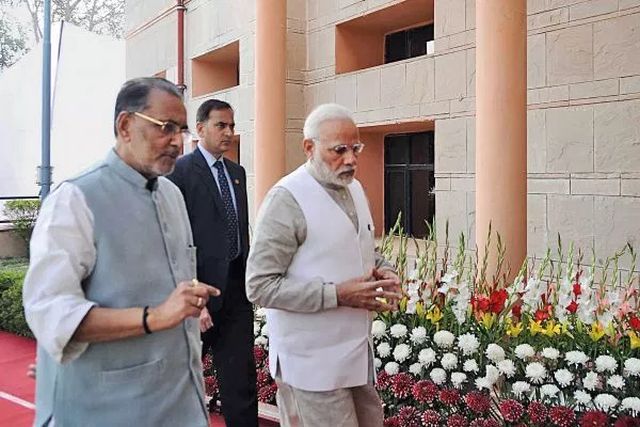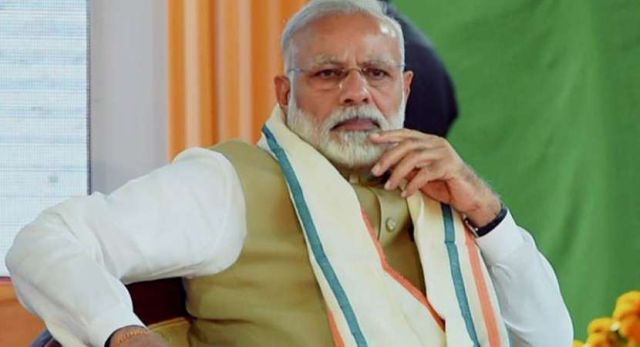
by admin | May 25, 2021 | News, Politics
 Lucknow : Uttar Pradesh Chief Minister Yogi Adityanath on Thursday thanked Prime Minister Narendra Modi for approving the metro rail projects for Agra and Kanpur, officials said.
Lucknow : Uttar Pradesh Chief Minister Yogi Adityanath on Thursday thanked Prime Minister Narendra Modi for approving the metro rail projects for Agra and Kanpur, officials said.
He said these projects will not only ease congestion but also make commuting easier and environment friendly.
The Union Cabinet in a meeting chaired by Modi approved the Kanpur metro rail project having two corridors which will connect major public nodes and cluster areas of the city.
The length of IIT to Naubasta corridor will be 23.785 km. It would be partly elevated and partly underground. The section has 22 stations — 14 elevated and 8 underground.
The length of Agriculture University to Barra-8 corridor is 8.60 km comprising four elevated and four underground stations. The estimated cost of the project is Rs 11,076.48 crore and the project will be completed in 5 years, officials said.
IIT Kanpur to Naubasta corridor will pass through heart of the city covering several prominent educational institutions, railway and bus stations, including IIT Kanpur, CSJM University, GSYM Medical College, Jhakarkati bus station and Kanpur Central railway station.
The Cabinet also approved Agra metro rail project having two corridors. It would pass through the heart of the city and connect prominent tourist places including Taj Mahal, Agra Fort and Sikandra as well as ISBT, Raja Ki Mandi Railway Station, Medical College, Agra Cant Railway Station, Collectorate, Sanjay Place and surrounding densely populated residential areas.
—IANS

by admin | May 25, 2021 | Business Summit, Economy, Events, News, Politics
 New Delhi : Noting that his government had achieved the unprecedented dual objective of sustained high growth combined with low inflation, Prime Minister Narendra Modi on Saturday said innovation and technology would provide the backbone of “resurgence” for a “new India”.
New Delhi : Noting that his government had achieved the unprecedented dual objective of sustained high growth combined with low inflation, Prime Minister Narendra Modi on Saturday said innovation and technology would provide the backbone of “resurgence” for a “new India”.
Addressing the ET Global Business Summit, Modi said that unlike earlier governments in the post-liberalisation era, the outgoing National Democratic Alliance (NDA) government had achieved both sustained high growth of over 7 per cent and low single-digit inflation.
“The previous government achieved an average annual growth rate of 6.5 per cent with inflation in double digits,” he said.
“However, between 2014 and 2019, the average annual growth rate has been 7.4 per cent, while the average inflation rate has been 4.5 per cent. Post the liberalisation in 1991, this has been the highest rate of average growth combined with the lowest average rate of inflation.”
He said the current transformation underway in the economy was the result of sound macroeconomic fundamentals which is reflected, for instance, in the “increasing bouquet of financing resources”.
“There is no more the sole dependence on bank credit for raising capital. While between 2012 and 2014, the average finance raised through equity was Rs 14,000 crore per annum, in the last four years this average has gone up to Rs 43,000 crore,” he said.
“Alternative Investment Funds (AIF) raised less than an average of Rs 4,000 crore between 2011-14, but under our government AIF, during 2014-18, this figure has gone up to Rs 81,000 crore, recording a jump of 20 times,” Modi added.
Declaring that “New India” would be an active contributor to the Industrial Revolution 4.0, the Prime Minister said that “innovation and technology will form the backbone of this resurgence”.
Citing indicators of the resurgence, Modi said that the number of patents granted had gone up over three-fold, from 4,000 in 2013 to 13,000 in 2017-18.
“Trademarks registered have gone up from 68,000 in 2013-14 to 2.5 lakh in 2016-17, a four-fold increase,” he added.
—IANS

by admin | May 25, 2021 | News, Politics
 New Delhi : Congress President Rahul Gandhi on Friday took a jibe at Prime Minister Narendra Modi calling him ‘Prime Time Minister’ and said that when people were crying over the deaths in Pulwama, Modi was indulging “gleefully” in a photoshoot.
New Delhi : Congress President Rahul Gandhi on Friday took a jibe at Prime Minister Narendra Modi calling him ‘Prime Time Minister’ and said that when people were crying over the deaths in Pulwama, Modi was indulging “gleefully” in a photoshoot.
“Three hours after the news of the killing of 40 soldiers in Pulwama, ‘Prime Time Minister’ continued shooting the film, Gandhi said.
“There was a lot of pain in the heart of the dear ones of the martyrs — they were going through ‘a sea of emotion’, while the PM was laughing at a photoshoot on a river,” the Congress chief tweeted in Hindi referring to the photoshoot on a lake.
Gandhi’s Twitter dig was preceded by a press conference by party spokesperson Manish Tewari where he raised question over Modi’s actions in the immediate aftermath of the worst ever attack in Jammu and Kashmir since 1989, in which 40 Central Reserve Police Force troopers were killed.
The Congress for the second day on Friday asked why he failed to mention the attack and its victims while addressing a rally in Rudrapur district of Uttarakhand just two hours later.
“We want to ask the Prime Minister what he was doing between 3.10 p.m. (when the attack happened) and 5.10 p.m.
At 4.40 p.m., he addressed a rally through mobile phone. To the best of our knowledge, not even once did he mention the attack,” said Tewari earlier at the presser, where he played a DD news video as evidence of PM’s address.
“If he had condemned the Pulwama attack, he would have paid a tribute to the martyrs.. none of that happened,” he said, adding that Modi “deliberately” chose not to mention the martyrs.
“There can be no greater insensitivity than that,” he said.
The Congress leader said there was an even “more frightening scenario” than the Prime Minister merely failing to mention the attack in his speech.
“Was he unaware of the attack between 3.10 p.m. and 5.30 p.m.? He was either not informed about it by his office or he was incommunicado. That speaks a lot about the state of communication in the higher echelons of Indian state,” Tewari said.
He stressed the point that India being a nuclear power — surrounded by another nuclear power in Pakistan — cannot afford to have leaders who cannot be communicated in time.
“If you (Modi) didn’t know that there was an attack, can there be a greater incompetence,” he said.
The Congress even dismissed government’s decision on Thursday of stopping water of three eastern rivers — the Beas, Ravi and Sutlej — to Pakistan as “high octane jingoism” and termed it a subterfuge to hide the failure of the national security.
“The BJP-NDA government is a brilliant mix of arrogance and ignorance,” he said.
—IANS

by admin | May 25, 2021 | News, Politics
 Seoul : Prime Minister Narendra Modi on Friday said here that the time has come for the global community to “come together” and “go beyond words” to act against terrorism, as he expressed his gratitude for South Korea’s support in the wake of the Pulwama attack.
Seoul : Prime Minister Narendra Modi on Friday said here that the time has come for the global community to “come together” and “go beyond words” to act against terrorism, as he expressed his gratitude for South Korea’s support in the wake of the Pulwama attack.
Addressing the media on the second day of his two-day visit after his talks with South Korean President Moon Jae-in, Modi said: “I express my gratitude to President Moon for his condolences on Pulwama attack last week and his support against terror.”
He said the Memorandum of Understanding (MoU) signed between India’s Home Ministry and South Korea’s National Police Agency will further forward the counter-terrorism agenda.
“Time has come for the global community to come together and go beyond words to act against terrorism,” he said.
At least 40 Central Reserve Police Force (CRPF) troopers were killed in the worst-ever terror attack in Jammu and Kashmir since militancy hit the state in 1989. A Jaish-e-Mohammad operative on February 14 rammed an explosive laden SUV into a CRPF bus on the Jammu-Srinagar highway in Pulwama.
Modi said both New Delhi and Seoul are committed to strengthen their mutual and global cooperation to combat terrorism.
He said the defence sector is an important part of the country’s growing partnership with South Korea. “And induction of K-9 Vajra artillery gun in Indian Army ia an example of this friendship.
“To increase cooperation with South Korea in the defence sector, we have agreed to make a roadmap for defence technology and co-production,” he said.
He also welcomed the partnership of South Korean companies in the defence industrial corridors being built.
The bilateral relations between the two nations have reached new heights, he said, adding that the special strategic partnership that New Delhi-Seoul shares is “very significant” even for the world.
Modi is on two-day visit to South Korea. Later in the day, he will be accorded with the Seoul Peace Prize.
—IANS

by admin | May 25, 2021 | Economy, News, Politics
 New Delhi : With Election Commission expected to announce the schedule of Lok Sabha elections in the first week of March, the Union Cabinet on Tuesday took 23 decisions and the Cabinet Committee on Economic Affairs (CCEA) approved five proposals which will benefit various sections including Central government employees and farmers.
New Delhi : With Election Commission expected to announce the schedule of Lok Sabha elections in the first week of March, the Union Cabinet on Tuesday took 23 decisions and the Cabinet Committee on Economic Affairs (CCEA) approved five proposals which will benefit various sections including Central government employees and farmers.
The decisions, taken by the Union Cabinet and the CCEA presided over by Prime Minister Narendra Modi, included approval of four ordinances as the related bills could not be passed in the Budget Session of Parliament that ended earlier this month. It was the last parliament session before the Lok Sabha polls.
The government decided to re-promulgate the triple talaq ordinance even as most of the opposition parties are opposed to it. The BJP apparently hopes to get support of sections of Muslim community, particularly women, with its earlier push to the bill and the approval of the ordinance.
It also approved banning of unregulated deposit schemes ordinance, which is expected to find a mention in poll speeches in West Bengal.
The government gave its approval to the release of an additional instalment of Dearness Allowance (DA) to Central government employees, and Dearness Relief (DR) to pensioners. It will benefit about 48.41 lakh Central government employees and 62.03 lakh pensioners.
The CCEA approved Kisan Urja Suraksha evam Utthaan Mahabhiyan with the objective of providing financial and water security to farmers.
Other decisions of the cabinet include approval of the Ahmedabad Metro Rail Project Phase II and Delhi-Ghaziabad-Meerut corridor of RRTS (regional rapid transit system). It also approved the proposal of National Policy on Electronics which is aimed at creating lakhs of jobs apart from other benefits.
Some of the decisions also relate to international agreements and other government matters.
—IANS

 Lucknow : Uttar Pradesh Chief Minister Yogi Adityanath on Thursday thanked Prime Minister Narendra Modi for approving the metro rail projects for Agra and Kanpur, officials said.
Lucknow : Uttar Pradesh Chief Minister Yogi Adityanath on Thursday thanked Prime Minister Narendra Modi for approving the metro rail projects for Agra and Kanpur, officials said.



